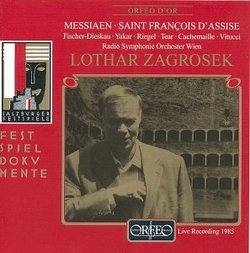| All Artists: Dietrich Fischer-Dieskau, Olivier Messiaen, Lothar Zagrosek, ORF Vienna Radio Symphony Orchestra, Radio Symphonieorchester Wien, Gilles Cachemaille, Jeanne Loriod, Kenneth Riegel, Rachel Yakar, Robert Tear, Sebastian Vittucci, Valerie Hartmann-Claverie Title: Olivier Messiaen: Saint François d'Assise Members Wishing: 0 Total Copies: 0 Label: Orfeo D'or Release Date: 9/16/2000 Genre: Classical Styles: Opera & Classical Vocal, Historical Periods, Modern, 20th, & 21st Century Number of Discs: 2 SwapaCD Credits: 2 UPC: 789368754120 |
Search - Dietrich Fischer-Dieskau, Olivier Messiaen, Lothar Zagrosek :: Olivier Messiaen: Saint François d'Assise
 | Dietrich Fischer-Dieskau, Olivier Messiaen, Lothar Zagrosek Olivier Messiaen: Saint François d'Assise Genre: Classical
|
Larger Image |
CD Details |
CD ReviewsGood but predictable Messiaen. Karl Henzy | 12/18/1998 (3 out of 5 stars) "Through the early 60s, Messiaen was certainly one of the most original and influential voices in music. From about '63 (Et Expecto Ressurectionem) to his final work (Illuminations of the Beyond, 1992) he became almost a parody of himself, his music becoming more and more monumentalized (not in a good way). In some ways St. Francoise is his culmination work--it has everything you'd come to expect from him, stretched out over 6-hours (this CD has a little less than half of it). Then again, its predictability can be seen as its problem. While Elliott Carter, born just a day apart from Messiaen, has continued to surprise and challenge, Messiaen has not. I'd invest my money in a few cheaper CDs: Turangalila-Symphony, Trois Petites Liturgies, Couleurs de la Cite Celeste, and I suppose Quartet for the End of Time." USEFUL COMPLEMENT TO COMPLETE VERSIONS Klingsor Tristan | Suffolk | 10/24/2005 (4 out of 5 stars) "This is a fascinating complement to the complete recordings of Messiaen's massive opera under Ozawa and Nagano. It is based on performances of 4 out of the 8 scenes that Fischer-Dieskau took around Europe soon after its first performance (I heard him at the Festival Hall). This recording was made at the Salzburg Festival of 1985.
Jose van Dam made the title-part very much his own in early performances of the piece - he sings it on both the complete recordings. But his interpretation has always struck me as a little passive in what is already a very passive opera. Fischer-Dieskau is much more a man of action, much readier to get involved with his disciples, with the Leper, with his beloved birds, even with the Angel. (David Wilson-Johnson took this interpretation even further in a fine semi-staged performance of the complete opera). I think this view of the part is much truer not only to the historical St. Francis, but also to Messiaen's view of him. Just listen to all that hyperactive percussion around him. And, while St. Francis' melodic line may be for the most part sustained legato, that does not preclude drama and involvement. Fischer-Dieskau's voice was beginning to show signs of age by the time this recording was made, but his familiar ability to use words and text to the full reaps huge benefits in these long scenes. His is by far the dominant part in this opera. The other singers here are a somewhat mixed bag. Kenneth Riegel is/was the definitive Leper, whether self-pitying about his disease or vocally dancing with ecstasy at his cure. Rachel Yakar, on the other hand, is not really a match for the serene purity of either Christiane Eda-Pierre or Dawn Upshaw on the complete recordings. The Franciscan brothers are a pretty well matched group, whichever version you choose. The recording of the live performance here is excellent - clear, vibrant and vivid. There is a greater prominence given to the three Ondes Martenot demanded by the score which, I think, serves the overall sound particularly well. All three conductors have the measure of Messiaen's huge score - if I had to choose one of them, it would probably be Nagano by a short head - but Lothar Zagrosek produces glittering sounds of great depth. His tempi are all well judged - none of the Tableaux outstays its welcome. Not necessarily a first choice, these discs, as you'll probably want the complete opera, but well worth hearing alongside one of the other versions. " |

 Track Listings (11) - Disc #1
Track Listings (11) - Disc #1